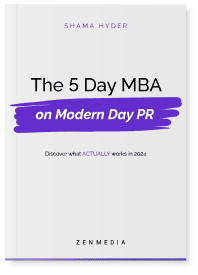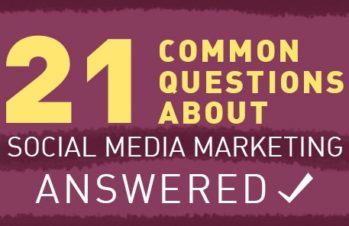“We need more people talking about us!” As a CMO, or PR director, how many times has someone at the top come to you and said those exact words? Did you immediately start to feel the heat? When an organization decides it needs PR representation or that their current PR strategy needs an overhaul, it usually starts with a desire to create more buzz. And many times, this desire is motivated by a positive article in the local news about a competitor, or a look at another company’s thousands of seemingly engaged Twitter followers eagerly and happily interacting with their brand online.
THE GOAL
Simply creating buzz should not be the end goal for ramping up PR efforts. In the past, the end goal of public relations for brands may have been limited to raising brand awareness, but as the digital age has caused a major shift in how we satisfy consumer appetites, the goal of public relations, as with most all marketing disciplines, has evolved into a focus on building brand loyalty and fostering brand ambassadorship — and this can’t be accomplished by sending out a press release and landing a few stories. To connect, consumers want to “know” their brands, and to know that their brands “know” and understand who they are as well.
When searching for a PR partner, the most important thing to know about prospective agencies is what tools they have in their toolbox that will fully-optimize your efforts to connect. And beware, if they’re only speaking in terms of media relations and getting media coverage, it may generate some buzz, but may leave behind many opportunities to create deeper, lasting and more meaningful connections with your target audience. You want your consumer to not only buzz about you for a moment, but to fully engage with what your brand means for their life. Your prospective agency should understand and communicate this unprompted.
THE SEARCH
The search for a PR agency can be a daunting task. Depending on your organization, it can be as involved as putting out a Request for Proposal, or as simple as scrolling through your contacts for referrals. Let’s say you go the referral route, which is quite common. It may go something like this:
One colleague recommends Agency A, and says, “These guys got us a ton of media coverage for our [insert campaign — product launch, store opening, new pricing model, etc.]. You should call them!”
Another colleague recommends you meet with Agency B, and tells you that they did all their social media marketing, set up an e-newsletter campaign for them, started tweeting for them and got thousands of new followers and 3,300 new “Likes” on Facebook.
Yet another colleague suggests you reach out to Agency C, and says, “I don’t know if these guys do PR, but they helped us get our website up to speed and SEO-friendly; now we’ve got all the right keywords, and a digital newsroom and a blog and we’re getting tons more traffic to our site.”
All of these options sound great―and the truth is, all of them are―but what you need to know is that they don’t have to be, and shouldn’t be, mutually exclusive of one another. A good PR firm designs strategies that deliver across all of these platforms to accomplish the goals of creating loyal consumers that tell their friends about your brand.
THE ANSWER
Today, digital public relations is public relations and it’s defined by a strategy that seamlessly incorporates traditional PR and media relations with social media and content marketing, which are all anchored by a good search program. In digital PR, these elements are not executed in silos. In fact, it is critical that they work together in order to achieve the desired results. If your prospective PR partner is not integrating, than they haven’t fully optimized what PR can do for your brand.
And just because an agency does traditional PR, social media and adds links to your press releases doesn’t mean they’ve adopted a fully-integrated, holistic approach. When you listen closely to how capabilities are described, do they speak about each one independently of the other? If so, you’ll have a sense of any silos that might impede getting the most from your PR effort. Finally, there are few questions that you can ask that will help you determine if the agency is using an integrated approach:
- What is your philosophy on how to approach PR? Has, or how has, that philosophy evolved in the digital age?
- How are you integrating traditional PR with social media, content marketing and SEO? Provide examples of how you have executed this approach for a client.
- Does your team have the expertise in-house to carry out a fully-integrated approach, or are there strategic partners you work with to help execute certain elements?
- How are you currently integrating SEO best practices into your traditional PR efforts?
- How are your account teams structured and what role does each member play? The goal here is to find out if account teams include a good mix of contributors who specialize in each discipline, but work together on execution.
In time, it’s likely the “digital” will drop off of the moniker “digital PR.” It’s kind of like saying flat screen TV. Do we really need to describe them as flat screen anymore? No, it’s just a TV. And now, “digital PR” is just what PR is.
To learn more about how digital PR can boost your organization’s PR efforts, contact the Zen Media Group and we’ll connect you with a team of PR integration specialists that can help fully-optimize your target market outreach for greater brand loyalty and enthusiastic ambassadors.







